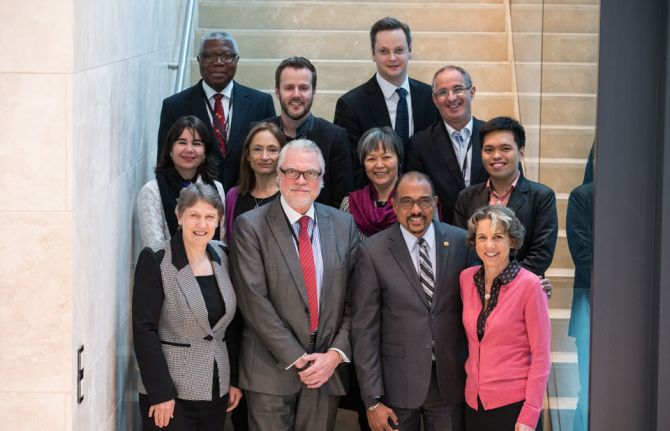

Update
Review panel meets to strengthen UNAIDS model
24 January 2017
24 January 2017 24 January 2017A special panel has begun deliberations on how to strengthen UNAIDS’ unique model and further align it to international efforts to achieve the 2030 Agenda for Sustainable Development.
The Global Review Panel on the Future of the UNAIDS Joint Programme Model includes representatives of United Nations Member States, key populations affected by HIV, United Nations agencies and other multilateral organizations and private foundations. Established by the UNAIDS Programme Coordinating Board, the panel is co-convened by Helen Clark, Chair of the United Nations Development Group, and UNAIDS Executive Director Michel Sidibé and co-chaired by Awa Coll-Seck, Health Minister of Senegal, and Lennarth Hjelmåker, Sweden’s Ambassador for Global Health.
At the first meeting of the panel, held on 20 January in Geneva, Switzerland, Ms Clark called on the panel to ensure that UNAIDS remains at the forefront of United Nations reform, while Mr Sidibé challenged panel members to develop bold ideas for the future of the Joint Programme.
Mr Hjelmåker praised UNAIDS for its leadership, advocacy and catalytic role within the global response to HIV. He also highlighted that key aspects of the Joint Programme need to be refined and reinforced to ensure that joint United Nations efforts on AIDS are fully integrated within the broader health agenda and the Sustainable Development Goals.
During the meeting, panel members achieved consensus on key issues to be addressed within three fundamental pillars of the Joint Programme: joint working, governance, and financing and accountability. Moving forward, these issues will be further discussed in February within a public virtual consultation. The panel will meet again in March to consider the results of the public consultation and agree on a set of recommendations.
Quotes
“The interlinked nature of the 2030 Agenda calls for integrated approaches to sustainable development. The global AIDS response has always required us to work in this way, especially when it comes to addressing the social and structural factors which contribute to the spread of HIV."
“The Joint Programme is unique. We have been able to demonstrate that we can mobilize diverse partnerships, engage in different forms of governance, deliver results and ensure people are not left behind. We need to retain these fundamental elements while introducing innovations that will accelerate the AIDS response.”
"Having accompanied UNAIDS on its journey for two decades, I can say confidently that it has many strengths that are extremely relevant to current efforts around United Nations reform. But even UNAIDS must adapt to the current environment. We are tasked with identifying key challenges and making recommendations that will generate real change and that are feasible to implement.”
“UNAIDS continues to be heralded as an innovative good practice 20 years later. Its efforts to include civil society, key population communities and those most affected by HIV showcase how the Joint Programme values a responsive approach towards addressing the epidemic, and accountability to those most affected. This must continue.”



